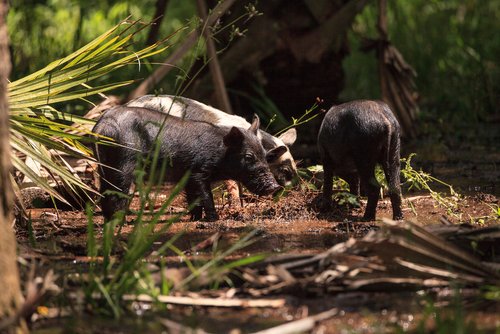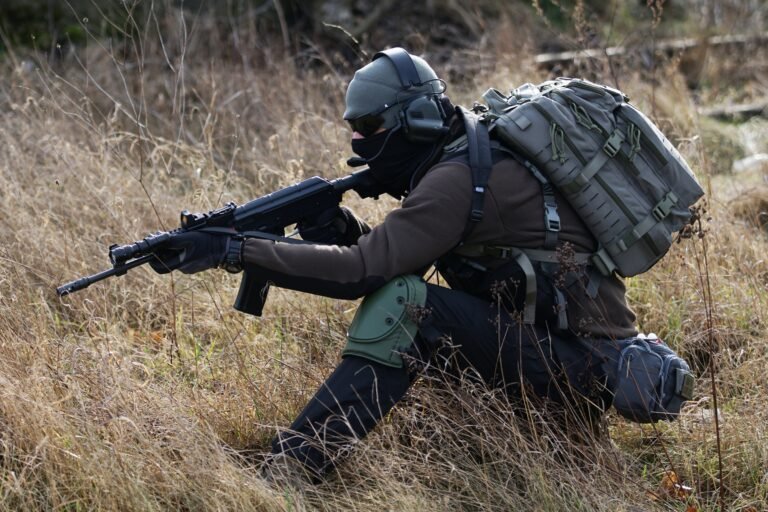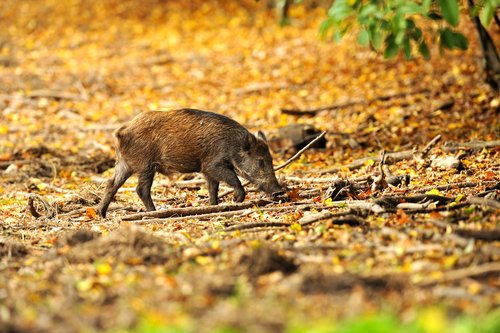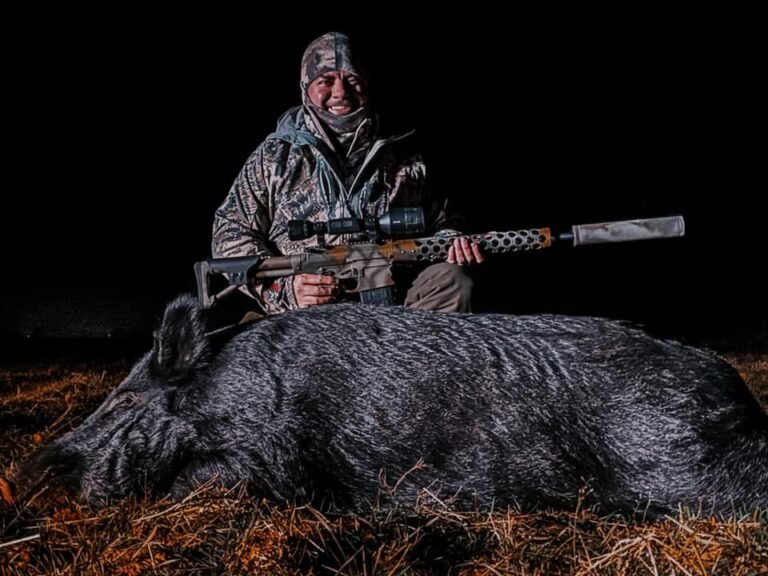South Carolina Hog Hunting – A New Southern Tradition is Born
Picture this: a group of hunters armed with rifles and shotguns venturing into the dense forests of South Carolina in search of elusive wild hogs. South Carolina hog hunting has become more than just a pastime; it’s a thrilling adventure embraced by many outdoor enthusiasts.
The Palmetto State offers an ideal environment for hog hunting, with its vast tracts of woodland and agricultural areas providing ample opportunities to engage in this exhilarating pursuit.
Hog hunting has gained immense popularity in recent years due to the abundance of these destructive creatures across the state. A staggering number of hogs roam freely throughout South Carolina, wreaking havoc on farms, damaging crops, and disrupting the ecosystem’s delicate balance.
This invasive species poses significant challenges for landowners and farmers who strive to protect their livelihoods from these voracious pests. Consequently, hog hunting has emerged as an effective control measure that mitigates the damage caused by these animals and provides thrilling encounters for hunters seeking an adrenaline-fueled experience.
Mention of the State’s Abundant Hog Population and Its Impact on the Ecosystem
It’s hard to believe how much havoc a group of wild hogs can inflict upon an ecosystem until you witness it firsthand. In South Carolina, these prolific breeders have multiplied rapidly over time, posing a serious threat to native wildlife habitats and agricultural lands.
With no natural predators to keep their population in check, wild hogs have thrived across various regions within the state. The consequences are far-reaching.
These destructive creatures ravage fields and gardens and dig up soil extensively while searching for food, leaving behind a trail of destruction that is expensive and time-consuming to repair. Moreover, their insatiable appetite for eggs, young reptiles, and small mammals puts additional strain on the local wildlife populations, disrupting the balance of the delicate ecosystem.
Against this backdrop, hog hunting in South Carolina is critical. It serves as a means to control and manage the burgeoning hog population while helping restore ecological harmony.
By participating in this thrilling pursuit, hunters actively contribute to preserving native habitats and safeguarding agricultural lands from further destruction. Stay tuned for more sections of this exciting South Carolina hog-hunting article!
Understanding Wild Hogs in South Carolina
Physical Characteristics and Behavior
When it comes to wild hogs in South Carolina, these creatures are no small fry. They can grow to impressive sizes, with the average adult weighing anywhere from 100 to 300 pounds. These formidable beasts boast a variety of physical characteristics that make them well-suited for survival in the wild.
With their muscular bodies covered in coarse bristles, sharp tusks protruding from their powerful jaws, and a keen sense of smell, they are truly a force to be reckoned with. In terms of behavior, wild hogs are highly adaptable and intelligent animals.
They possess a strong social structure, often traveling in groups known as sounders consisting of sows (females) and their young piglets. Boars (males) tend to be more solitary by nature but will join up with sounders during mating season or when there is competition over resources.
Don’t let their stout appearance fool you; these hogs can move swiftly when necessary! They are known for their impressive agility and can reach speeds up to 30 miles per hour when running.
Habitat Preferences and Establishment
Wild hogs have found a comfortable home amidst the diverse landscapes of South Carolina. From dense forests to wetlands and agricultural fields, these adaptable creatures have successfully made themselves at home all across the Palmetto State.
However, it’s important to note that they do have specific preferences when it comes to habitat. Wild hogs thrive in areas with ample food sources, such as acorns, tubers, roots, insects, and even small mammals.
They prefer areas with access to water sources like swamps or river bottoms for wallowing and cooling off during hot summer days. While they primarily inhabit wooded areas due to the cover provided by thick vegetation, they are also found in open fields and pastures, especially during the night when they venture out to forage.
South Carolina’s varied landscape offers everything a wild hog could dream of, allowing them to establish themselves and expand their population over time easily. Understanding wild hogs’ physical characteristics, behavior, and habitat preferences is crucial for successful hog hunting in South Carolina.
By familiarizing ourselves with these remarkable creatures, we can better appreciate their resilience and adaptability. But let’s not forget that hunting wild hogs is more than just an exciting sport; it also serves as a vital management tool to control their population and mitigate their impact on the ecosystem.

Hunting Regulations and Licensing in South Carolina
The Ins and Outs of Hog Hunting Seasons, Bag Limits, and Weapon Restrictions
South Carolina is a state that takes its hunting seriously, and hog hunting is no exception. As an avid hog hunter, it’s crucial to understand the regulations and licensing requirements before embarking on your hunting adventure in the Palmetto State.
When hunting seasons for wild hogs in South Carolina, the good news is that they are open year-round. Unlike some other game species with specific hunting seasons, hogs roam freely throughout the year, allowing hunters ample opportunities to pursue them whenever possible.
This flexibility means you don’t have to wait for a specific time of year to indulge in your passion for hog hunting. While there are no bag limits imposed on hog hunting in South Carolina, it’s essential to remember that responsible harvesting practices are crucial for maintaining a balanced ecosystem.
The Department of Natural Resources (DNR) encourages hunters not to waste any harvested hogs by utilizing as much of the animal as possible. Respecting bag limits voluntarily puts less pressure on the population while allowing hunters exciting opportunities.
As with any hunting or fishing activity, adhering to weapon restrictions is critical for safety reasons and maintaining ethical standards. In South Carolina, hunters can use any legal firearm during hog hunts.
This means you can choose from firearms, such as rifles or shotguns, based on personal preference and comfort level. However, it’s always a good idea to familiarize yourself with local laws regarding firearm usage before heading out into the field.
Obtaining Your Licenses and Permits – The Keys to Responsible Hog Hunting
Before setting foot into South Carolina’s vast wildlands in pursuit of feral hogs, one must secure the licenses and permits required by law. Obtaining these documents is a legal requirement and a means of promoting responsible and sustainable hunting practices.
Individuals must possess a valid hunting license issued by the state’s DNR to engage in hog hunting in South Carolina. This license allows hunters to pursue hogs and other game species, making it a versatile investment for outdoor enthusiasts.
Additionally, hunters should be aware that separate licenses may be required for hunting on public lands versus private property. Researching and understanding the specific regulations governing the area you plan to hunt is vital.
In some cases, additional permits may be necessary depending on the method or location of your hog hunt. For instance, if you intend to use dogs during your hunt, you might need a separate permit allowing dog-assisted hunting.
These permits help regulate activities and ensure that all hunters follow proper protocols when using specialized techniques. Understanding and abiding by the regulations surrounding hog hunting in South Carolina is paramount.
Familiarize yourself with the state’s hunting seasons, bag limits (or lack thereof), and weapon restrictions to ensure that your hunting experience remains safe, ethical, and enjoyable for both you and future generations of hunters. Don’t forget to obtain the necessary licenses and permits before embarking on your adventure – they are legal requirements and key tools in promoting responsible hog hunting practices throughout the beautiful Palmetto State.
Popular Hog Hunting Techniques in South Carolina
Spotlighting: Unveiling the Nighttime Pursuit
Picture this: a moonlit night, the air heavy with anticipation, and your heart pounding as you venture into the dark woods of South Carolina on a hog-hunting expedition. One of the most popular techniques in the Palmetto State is spotlighting, a method that harnesses artificial light to locate hogs under cover of darkness.
This thrilling technique adds a layer of challenge to your hunt and ensures an adrenaline-fueled experience. Spotlighting involves using powerful spotlights or handheld lamps to scan fields, woodlands, and dense vegetation.
The beams of light cut through the darkness like a beacon, revealing elusive hogs lurking in their natural habitats. This technique capitalizes on hogs’ poor eyesight but exceptional sense of hearing and smell.
Hunters gain a crucial advantage by catching them off guard with well-aimed illumination. To maximize effectiveness during spotlighting hunts, hunters should maintain stealthy movements while scanning the surroundings for any signs of movement or reflection from hog eyes.
It’s essential to familiarize oneself with local regulations regarding spotlighting to ensure compliance and responsible hunting practices. So gear up, embrace the thrill of nocturnal pursuit, and let those spotlights illuminate your path to hog-hunting success!
Dog Hunting: Unleashing Fierce Companions in Pursuit
In hog hunting in South Carolina, few techniques exemplify teamwork like dog hunting does. This time-honored method relies on well-trained dogs using their innate tracking instincts and agility to locate and corral hogs for hunters’ harvest.
Equipped with exceptionally keen senses and relentless determination, trained dogs are indispensable companions during these exciting hunts. Their acute sense of smell allows them to detect scent trails left behind by hogs, even in the most challenging terrains.
Once they catch wind of their quarry, these four-legged hunters unleash their boundless energy, chasing hogs through forests and underbrush. As dogs close in on their targets, they bark and bay to alert hunters of the hog’s location.
This intense auditory exchange between man’s best friend and hunters adds an exhilarating element to the chase. With proper training, dogs learn to corner hogs until the hunter can safely approach for a precise shot.
Dog hunting enhances the overall experience and improves efficiency by covering vast areas and ensuring successful hunts. However, training your canine companions properly and prioritizing their safety during these encounters with wild hogs is crucial.
So whether you prefer spotlighting under the night sky or embarking on a spirited dog-assisted pursuit, South Carolina offers a variety of techniques that cater to every adventurous hog hunter’s taste. Embrace the methods that resonate with you most and immerse yourself in an unforgettable hunting experience amidst the picturesque landscapes of this beautiful state.
Equipment and Gear for Hog Hunting in South Carolina
Firearms
When it comes to hog hunting in the Palmetto State, choosing the right firearm is crucial for a successful and safe hunt. The terrain in South Carolina can vary from dense forests to open fields, so it’s important to consider your surroundings when selecting a firearm.
Rifles are popular among hog hunters due to their accuracy and range. Calibers such as .243 Winchester, .270 Winchester, and .30-06 Springfield are widely favored for their stopping power and versatility.
These calibers provide enough firepower to take down hogs of various sizes while minimizing the risk of over-penetration. Ammunition selection is equally important when hunting hogs.
Hollow-point or soft-point bullets are commonly used because they can expand upon impact, creating larger wound channels that increase the chances of an ethical kill. Using ammunition specifically designed for hunting rather than target or varmint loads is recommended.
Shotguns: Highlighting slug or buckshot choices for close-range encounters
For close-range encounters during hog hunting in South Carolina, shotguns offer an excellent option. Regarding shotshell selection, there are two primary choices: slugs and buckshot. Slugs are single projectiles that provide excellent penetration at shorter distances.
They offer more accuracy than buckshot but have a limited effective range beyond 50 yards. Many hunters prefer slugs with a sabot design as they provide better ballistic performance.
On the other hand, buckshot consists of multiple lead balls packed into a shotshell. This allows for a wider spread pattern, making it ideal for close-quarters engagements where quick follow-up shots may be necessary.
Buckshot is effective within shorter ranges – typically 30 yards or less – but may lack slugs’ long-range accuracy. Ultimately, the choice between slugs and buckshot will depend on factors such as hunting conditions, personal preference, and the specific requirements of your hunt.
Archery Equipment: Briefly touching upon bowhunting as an alternative method
While firearms are popular for hog hunting in South Carolina, some hunters prefer the challenge and thrill of bowhunting. Bowhunting requires more skill and precision due to its shorter effective range.
However, it offers a unique experience and can be incredibly rewarding. You’ll need a reliable compound or recurve bow with an appropriate draw weight for ethically taking down game animals to engage in bowhunting for hogs.
Broadheads designed specifically for big game hunting, like mechanical or fixed-blade broadheads, are typically used for their cutting power. Practicing extensively beforehand is crucial to ensure accurate shots and ethical kills.
Proper shot placement is essential when using archery equipment to minimize suffering and ensure a clean harvest. While firearms provide greater range and stopping power, bowhunting can offer a more intimate connection with nature during hog-hunting adventures in South Carolina.
Safety Considerations for Hog Hunting in South Carolina
Wearing appropriate protective gear such as blaze orange
When venturing into the thrilling world of hog hunting in South Carolina, it’s vital to prioritize your safety. One crucial aspect is the clothing you choose to wear.
Opting for blaze orange attire is not just a fashion statement; it can save lives. The bright hue makes you highly visible to other hunters, ensuring they can identify your presence from afar and avoid accidental mishaps.
Plus, it helps differentiate you from the surroundings, reducing the risk of being mistaken for a wild boar by fellow hunters with an itchy trigger finger. Blaze orange clothing isn’t limited to just a cap or vest; you should go all out with a full set of gear: jacket, pants, gloves—the whole shebang!
Remember, hogs aren’t the only ones roaming these woods; deer or turkey hunters could be nearby. By donning blaze orange from head to toe, you enhance your visibility further and provide others with a clear signal that you’re not some cloaked creature from another realm but rather an enthusiastic hog hunter ready to rumble.
Maintaining distance from wounded or cornered hogs
As exhilarating as hog hunting in South Carolina may be, we must always remember that we’re dealing with wild animals here—creatures whose razor-sharp tusks and fierce determination demand our respect. When engaging with wounded or cornered hogs during the hunt, it’s crucial to exercise caution and maintain a safe distance. Wild hogs can become unpredictable when injured or feeling trapped.
They might charge at you without warning like a bull out of hell! So make sure not to provoke them further by getting too close or attempting ill-advised heroics.
Keep your cool and back away carefully, allowing the hog to calm down or find an escape route. Remember, your priority is your safety, and it’s best to leave capturing wounded hogs to experienced professionals with the necessary skills and equipment.
By following these safety guidelines during your hog hunting adventures in the Palmetto State, you can enjoy the thrill of the hunt while ensuring that you and those around you return home unharmed. Stay safe out there, fellow hunters!
Hog Meat Processing and Utilization
Processing Wild Hog Meat at Home
When processing wild hog meat, many hunters in South Carolina prefer to do it themselves. The first step is field dressing the hog, which involves removing the internal organs and thoroughly cleaning the carcass. Once that’s done, it’s time for butchering. Hunters can break down the hog into cuts like roasts, chops, and ribs or grind the meat for sausages and ground pork.
Proper storage is essential to maintain freshness, so vacuum-sealing or wrapping in butcher paper will help preserve the meat’s quality. It’s important to note that wild hog meat can have a stronger flavor compared to domestic pork due to their varied diets and active lifestyle.
Professional Meat Processors
For those who prefer leaving the meat processing to experts, South Carolina offers a range of professional processors specializing in wild game. These processors have experience handling wild hogs and will ensure your meat is processed correctly and safely. They can help with everything from field dressing and butchering to packaging and freezing the meat according to your preferences.
Plus, they have access to equipment needed for efficient processing, such as large-scale grinders for making sausage or curing chambers for ham production. Opting for professional processors not only saves time but also ensures high-quality cuts of meat that are ready for cooking.
Highlighting Various Cooking
Southern Delights: Barbecue Glory
In South Carolina, where barbecue reigns supreme, it’s no surprise that wild hog meat makes its way onto many grills and smokers across the state. From whole hogs slow-roasted over open pits at traditional barbecues known as “pig pickings” to succulent pulled pork sandwiches slathered with tangy mustard-based sauce, hog meat offers an array of mouthwatering possibilities. Wild hog meat’s rich flavors and tender texture lend themselves perfectly to this classic Southern cooking technique.
Exploring Culinary Creativity
While barbecue may steal the spotlight, there’s plenty of room for culinary exploration with wild hog meat. Take a walk on the wild side and experiment with different cooking methods and flavor profiles. Marinating the meat or using rubs can help enhance its taste, while slow braising can result in tender, melt-in-your-mouth dishes like hickory-smoked ham hocks or spicy hog jowl stew.
Additionally, ground wild hog can be utilized in various recipes ranging from savory sausages and flavorful chili to tasty burgers and delectable meatballs. The versatility of wild hog meat opens up a world of culinary possibilities limited only by your imagination.
Conclusion
South Carolina’s abundant population of feral hogs provides exciting opportunities for hunting enthusiasts and a bountiful supply of delicious wild boar meat. Whether you process the meat at home or rely on professional processors, there’s no shortage of options for enjoying these flavorsome cuts.
From traditional barbecue delights that celebrate South Carolina’s culinary heritage to creative dishes that showcase your culinary prowess, the versatility of hog meat ensures that every meal is a treat. So grab your hunting gear and embark on an adventure pursuing these elusive creatures while knowing their bounty can grace your table with delectable dishes for months.
Embrace the spirit of hog hunting in the Palmetto State by savoring every bite while sharing stories with family and friends around a table filled with South Carolina’s finest culinary creations. Hunting in South Carolina isn’t just about thrilling pursuits; it’s about forging connections through food and celebrating nature’s abundance in all its delicious glor




